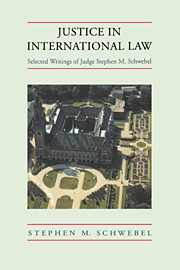Book contents
- Frontmatter
- Contents
- Preface
- PART I International Court of Justice
- PART II International Arbitration
- PART III United Nations
- PART IV International Contracts and Expropriation
- 23 Report of the Committee on Nationalization of Property of the American Branch of the International Law Association
- 24 The Story of the United Nations Declaration on Permanent Sovereignty over Natural Resources
- 25 Speculations on Specific Performance of a Contract between a State and a Foreign National
- 26 On Whether the Breach by a State of a Contract With an Alien is a Breach of International Law
- 27 Some Little-Known Cases on Concessions (with J. Gillis Wetter)
- 28 Commentary on “Social Discipline and the Multinational Enterprise” and “Security of Investment Abroad”
- PART V Aggression under, Compliance with, and Development of International Law
- List of publications
- Index
23 - Report of the Committee on Nationalization of Property of the American Branch of the International Law Association
A Response by the Committee on the Nationalization of Property of the American Branch to the Questionnaire of the International Committee on Nationalization
Published online by Cambridge University Press: 06 November 2009
- Frontmatter
- Contents
- Preface
- PART I International Court of Justice
- PART II International Arbitration
- PART III United Nations
- PART IV International Contracts and Expropriation
- 23 Report of the Committee on Nationalization of Property of the American Branch of the International Law Association
- 24 The Story of the United Nations Declaration on Permanent Sovereignty over Natural Resources
- 25 Speculations on Specific Performance of a Contract between a State and a Foreign National
- 26 On Whether the Breach by a State of a Contract With an Alien is a Breach of International Law
- 27 Some Little-Known Cases on Concessions (with J. Gillis Wetter)
- 28 Commentary on “Social Discipline and the Multinational Enterprise” and “Security of Investment Abroad”
- PART V Aggression under, Compliance with, and Development of International Law
- List of publications
- Index
Summary
Introduction
The Committee on the Nationalization of Property was created by the American Branch of the International Law Association. The American Branch requested the Committee to study the problem of nationalization of the property of aliens, as it concerns international law. The Committee is composed of lawyers whose experience, taken collectively, represents service as Government officials, teachers, and practitioners.
The members of the Committee live and work in a community whose foundations were built with capital funds from abroad. As the United States developed and industrialized, its citizens created financial resources and managerial and scientific techniques. A proportion of these funds and techniques are assets which may be used with assets of other countries to develop world trade and provide an increasing level of industrial development in other parts of the world. The assets other peoples possess include raw materials and natural resources, in many instances far beyond the foreseeable requirements of the States in which they are found. In some cases they include capital, and, in more cases, skills. The market potential of all countries of itself is an asset awaiting further development for mutual benefit.
In the ever-shrinking world community, whose population is estimated to be increasing by 70,000 per week, it is in the mutual interest of the United States and other States to maintain free association to develop the general level of productivity. All countries will gain by the mutual development of their natural, agricultural, and industrial resources; no country can best attain these ends alone. Economic interdependence is universal and acute.
- Type
- Chapter
- Information
- Justice in International LawSelected Writings, pp. 385 - 400Publisher: Cambridge University PressPrint publication year: 1994



